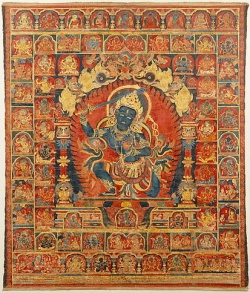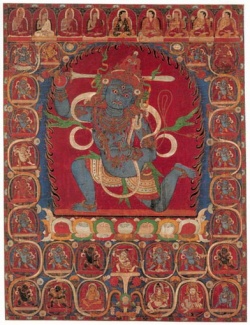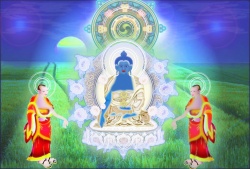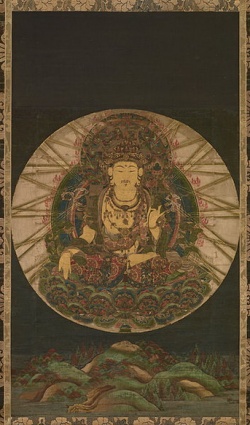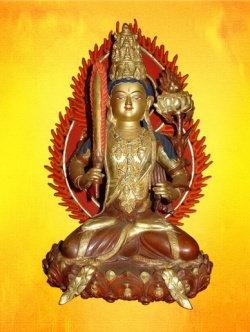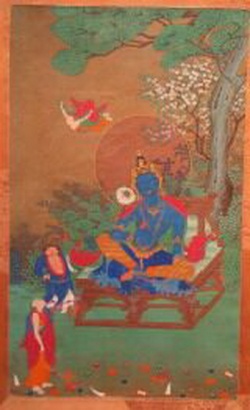Samyukta-āgama
(Skt.). The ‘Connected Discourses’, being one of the major sections of the Sūtra Piṭaka comprising around 3,000 sūtras and corresponding to the Saṃyutta Nikāya of the Pāli Canon. Many of the major Eighteen Schools of Early Buddhism had their own versions of these texts, although for the most part these have not survived. As well as recent discoveries of small portions of the Sarvāstivāda Saṃyukta Āgama in Sanskrit and several sūtras from that tradition in Tibetan translation, a complete version from the Sarvāstivādin school and an incomplete version from the Kāśyapīya school exists in Chinese. A comparison of the different versions that survive shows overall a high degree of consistency of content although each recension contains texts not found in the others. See also Āgama.
The Buddha sees a distracted monk 1
Thus have I heard, once, the Buddha was staying at the Deer Park near Vārāṇasī, the dwelling-place of sages.
At that time the World-honored One put on his robe, took his begging bowl and entered Vārāṇasī to beg for food. There he saw a monk, whose mind was not concentrated, whose senses were distracted. When this monk saw the Buddha coming in the distance, he hung his head in embarrassment. After the Buddha had finished his alms-round and washed his feet he entered the dwelling-places of the monks and entered his silent abode. When he came out of his silent abode again, he sat among the monks and said to them: “This morning I saw a monk, whose senses were not reined in. When he saw me coming in the distance, he became embarrassed, hung his head and reined in his sense-doors. Who was this?” Then the monk rose from his seat, arranged his his outer robe on his left shoulder, and placed his palms together in salutation said to the Buddha: “World-honored One! I was the one who was without concentration, whose senses were distracted.” The Buddha said: “Very good, monk! You were able to rein in your senses and focus your thought when you saw me. Whenever you see a monk, a nun, a lay-man or a lay-woman, you should do likewise. Control your senses and focus your thought, as if you were seeing me. This will bring you happiness and gain in the long night of saṃsāric existence.”
Then the monk spoke this verse:
“A monk went begging, entered the town /
his mind distracted, confused and unstable;
when he saw the Buddha, with diligent effort he reined in his senses /
therefore the Buddha said ‘Well done!’
Thus have I heard.
At one time there were many senior monks staying in the deer-park at Ṛṣipatana1 [near] Vārāṇasī, soon after the passing away of the Buddha.
Then, in the morning, the elder Chanda, putting on his [outer] robe and taking his bowl, went into the city of Vārāṇasī for alms-food.
After eating, he put away his robe and bowl and washed his feet. Then, taking his door-key he went from grove to grove, from lodging to lodging, from walking place to walking place, and to other places, and asked of the monks:
"Instruct me, teach me dharma, so that I may know dharma and see dharma! I will know according to dharma and observe according to dharma."
Then the monks said to Chanda: “Material form is impermanent; feeling, perception, activities, [and] consciousness are impermanent; all activities are impermanent; all dharmas are non-self; nirvāṇa is cessation.”
Chanda said to those monks: “I know that material form is impermanent; feeling, perception, activities, [and] consciousness are impermanent; all activities are impermanent; all dharmas are non-self; nirvāṇa is cessation.”
And he said: “But I am not delighted when I hear that all activities are empty, not to be grasped at; and that the destruction of craving, the fading away of desire is nirvāṇa.
"In this case, what is meant by self? And what is meant by saying that to know thus and to see thus is to see dharma?"
A second time and third time Chanda said the same. And then he asked: “Who is there here among you capable of teaching me dharma, so that I may know dharma and see dharma?”
Then he thought: “The venerable Ānanda is now staying in Ghosita park at Kosambī. He attended on and closely served the World-Honoured One. He was praised by the Buddha, and is known to all practitioners of the noble life. He must be capable of teaching me dharma, so that I may know dharma and see dharma.”
Then Chanda passed the night; and in the morning, having put on his [outer] robe and taken his alms-bowl, he went into the city of Vārāṇasī for alms-food.
After eating, he took up his bedding and put it away; then he took his robe and bowl, and set out for Kosambī. Travelling by stages he reached Kosambī.
Having put away his robe and bowl and washed his feet, he went to where the venerable Ānanda was, exchanged respectful greetings, and sat down at one side.
Then Chanda said to the venerable Ānanda:
"Once, senior monks were staying in the deer-park at Ṛṣipatana [near] Vārāṇasī. Then, in the morning, putting on my [outer] robe and taking my bowl, I went into the city of Vārāṇasī for alms-food.
"After eating, I put away my robe and bowl and washed my feet. Then, taking my door-key, I went from grove to grove, from lodging to lodging, from walking place to walking place, and to other places, and asked of the monks: ‘Instruct me, teach me dharma, so that I may know dharma and see dharma! I will know according to dharma and observe according to dharma.’
"Then, the monks taught me dharma: ‘Material form is impermanent; feeling, perception, activities, [and] consciousness are impermanent; all activities are impermanent; all dharmas are non-self; nirvāṇa is cessation.’
"I then said to those monks: ‘I know that material form is impermanent; feeling, perception, activities, [and] consciousness are impermanent; all activities are impermanent; all dharmas are non-self; nirvāṇa is cessation.
"But I am not delighted when I hear that all activities are empty, not to be grasped at; and that the destruction of craving, the fading away of desire is nirvāṇa.
"In this case, what is meant by self? And what is meant by saying that to know thus and see thus is to see dharma?’
"Then I thought: ‘Who is there capable of teaching me dharma, so that I may know dharma and see dharma?’
"And then I thought: ‘The venerable Ānanda is now staying in Ghosita park at Kosambī. He attended on and closely served the World-Honoured One. He was praised by the Buddha, and is known to all practitioners of the noble life. He must be capable of teaching me dharma, so that I may know dharma and see dharma.’
"Good, venerable Ānanda! Now you should teach me dharma, so that I may know dharma and see dharma."
Then, the venerable Ānanda said to Chanda: “Good, Chanda! My mind is delighted. I praise you as a benevolent one who is able to be open in the presence of a practitioner of the noble life, destroying the thicket of deception.
"O Chanda! an ignorant, ordinary person does not understand that material form is impermanent; that feeling, perception, activities, and consciousness are impermanent. All activities (compounded things) are impermanent; all dharmas (the nature of phenomena) are non-self; nirvāṇa is cessation.
"Now you are capable of receiving the most excellent dharma. Now listen carefully while I teach you."
At that time Chanda thought: “Now I am delighted to have attained the most excellent mind, to have obtained a joyful mind. Now I am capable of receiving the most excellent dharma.”
Then Ānanda said to Chanda: “I heard this myself from the Buddha when he was teaching Mahā-Katyā yana:
"Worldlings are confused, depending on two extremes: either existence or non-existence.
"Worldlings become attached to all spheres, setting store by and grasping with the mind.
"Katyāyana! If one does not feel, nor attach to, nor dwell in, nor set store by self, then, when suffering arises, it arises; and when it ceases, it ceases.
"Katyāyana! If one does not doubt, is not perplexed, if one knows it in oneself and not from others, then that is right view, the teaching of the Tathāgata (the Buddha).
"Why is this so? Katyāyana! If one sees rightly, as it really is, the arising of the world, one will not have the annihilationist view of the world. If one sees rightly, as it really is, the cessation of the world, one will not have the eternalist view of the world.
"Katyāyana! The Tathāgata, avoiding these two extremes, teaches the middle way, namely: When this is, that is; this arising, that arises.
"That is to say: Conditioned by ignorance, activities arise, and so on …, and thus arises the suffering of birth, old age, sickness, death, sorrow, and affliction.
"As for the saying, ‘when this is not, that is not; this ceasing, that ceases’, this is to say: Ignorance ceasing, activities cease, and so on …, and thus ceases the suffering of birth, old age, sickness, death, sorrow, and affliction."
When the venerable Ānanda had taught this dharma, the monk Chanda became freed from defilement and stain and acquired the pure dharma-eye.
At that time, the monk Chanda saw dharma, attained dharma, knew dharma, realised dharma; transcended doubt knowing it] not through another; in the dharma of the Great Teacher, he attained the state of fearlessness.
Respectfully saluting by joining palms, he said to the venerable Ānanda:
"It is just so! As it is the noble life of wisdom, a good friend teaches the discipline and the dharma.
"Now, I have heard the dharma from the venerable Ānanda thus: All activities are empty, tranquil, not to be grasped at; and the destruction of craving, the fading away of desire, cessation, is nirvāṇa.
"The mind is joyful, one dwells rightly in liberation, and there is no returning, no more seeing self; one sees only the true dharma." Then Ānanda said to Chanda:
"Now you have attained great benefit in the profound Buddha-dharma, you have attained the wisdom-eye."
Then the two noble ones, delighted with each other, rose from their seats, and returned each to his place.
